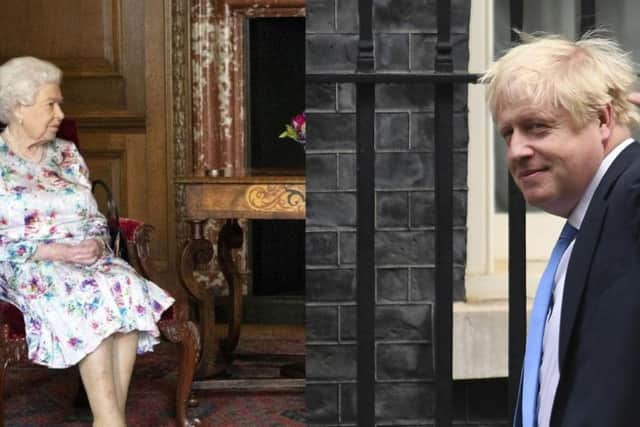Queen 'sought advice' on sacking Prime Minister, source claims
The Queen sought advice on the circumstances in which she could sack a prime minister ahead of Tuesday’s incendiary Supreme Court ruling, i has been told.
A source claims that the monarch asked her aides for the first time for clarification on just when and how she could dismiss a prime minister who refuses to step aside.
Advertisement
Hide AdAdvertisement
Hide AdThe alleged consultations reinforce suggestions that the monarch and her most senior aides had deep concerns about Boris Johnson’s decision to prorogue Parliament, even before the country’s most senior court was asked to declare the move unlawful.


It was reported on Sunday that Mr Johnson phoned the Queen to personally apologise for the embarrassment caused by the crushing Supreme Court ruling that he had acted unlawfully when he advised the monarch to suspend Parliament for five weeks - advice which she was obliged to accept.
Constitutional crisis
i has now been told that the Queen personally asked for advice on the constitutional circumstances in which she can effectively sack a prime minister.
Under the rules of the British constitution the Queen can only "advise, encourage and warn" ministers. It is suggested that the monarch has sought her own advice on the circumstances in which she could dismiss a prime minister.
Columnist Ian Birrell reports in Monday’s paper: “One well-placed source told me the Queen had, for the first time in her reign, sought advice on sacking a prime minister before the Supreme Court verdict.”
Buckingham Palace said on Sunday that it did not comment on rumours.
It is understood that while there have been discussions between Downing Street and the Palace about the constitution and the Queen’s role, it would not be the case that the monarch would take it upon herself to dismiss a prime minister or advise him or her to step down.
However, i understands that any discussions did not relate to an active attempt by the Queen and her most senior advisors to sack Mr Johnson.
Legal position
Advertisement
Hide AdAdvertisement
Hide AdHaving been embarrassed by the Supreme Court’s ruling that the prorogation of Parliament was unlawful, it is likely the Queen would not want to be caught out again, and would want to know her exact legal position should she be approached by opposition MPs in the event of Mr Johnson refusing to step aside after losing a vote of no confidence.
It is a quirk of the British constitution that the Queen retains a number of personal discretionary powers which include the right to appoint the prime minister and other ministers. A House of Commons select committee established in 2003 that these powers also include a right for the sovereign in a “grave constitutional crisis” to act contrary to, or even without, ministerial advice.
The Queen has been dragged into a constitutional crisis by Boris Johnson over decision to prorogue Parliament
Constitutional experts are indeed divided on the exact circumstances - if any - in which the Queen could remove a sitting prime minister.
In the event that Mr Johnson lost a vote of no-confidence in Parliament, there would follow a 14-day period in which MPs can vote to put forward a candidate to replace him.
Drag out proceedings
Some experts believe that only in the circumstances in which it could be shown by Parliament that an alternative prime minister can muster a majority, the Queen could require Mr Johnson to resign.
Others, however, argue that the Fixed Terms Parliament Act allows a sitting prime minister to recommend an election date after that 14-day period and therefore Mr Johnson could drag out proceedings in the absence of a clear power for the monarch to dismiss him.
The Queen has hitherto scrupulously avoided the use of any of her discretionary powers unless explicitly advised to do so by ministers.
Advertisement
Hide AdAdvertisement
Hide AdShe has also been careful to avoid being seen to adopt a position on any political matters. Consequently, the claim by David Cameron that he sought the Queen’s intervention during the Scottish referendum campaign has been reportedly the source of further displeasure in Buckingham Palace.
